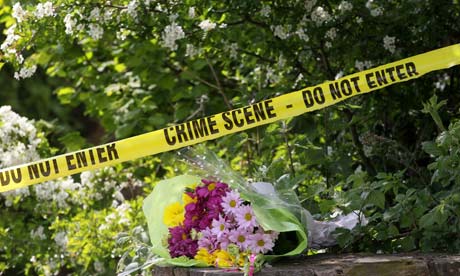Thursday, June 3, 2010
The British Perspective on Mass Shooting

A 52-year-old taxi driver in Cumbria, England
This is a horrible incident in any country. A lot of the questions being raised in the British press are the same ones we would expect if this happened in the United States: Were there warning signs missed? Why did it take police so long to catch him? As is natural after an incident like this, people are searching for someone to blame, because they need some way to reassure themselves that this sort of violence can be stopped. Who knows, maybe this could have been.
One question that is coming up rather prominently is a little different than you would expect in the United States, however. How did he get the guns? The United Kingdom has notoriously strict gun control laws
I heard an interview on NPR yesterday with a local journalist about the question of where the guns came from. Towards the end of the interview, the questions turned to the provenance of the guns. She said that police would be investigating whether the shooter was licensed to have a gun, and that "if he wasn't, that will be very bad."
Can you imagine someone saying that in the United States -- that it would be very bad to learn that a shooter didn't have a permit for a gun? I doubt it. We are used to the idea that people who are not supposed to have firearms have them anyway.
When this journalist says that finding out the shooter didn't have a permit would be "very bad," she's not talking about it being bad for the police or the government. She's not talking about it looking bad. What she's saying is that finding out that this man could get a gun illegally would mean that others can get them too. That would be dangerous, and it would represent a complete shift in how Britons think about gun violence in their country
We all live with the knowledge that we are in a certain amount of danger. If you live in a war zone, you make your peace somehow with that so you can sleep at night. If you live in the United States in a relatively quiet town, the amount of danger you have to make your peace with is much less, but it's not zero. If you live in Cumbria, England, there are various ways you could be subjected to violence or sudden injury or death, but being shot, until yesterday, was not something you had to worry about a whole lot. Today, they're very worried.
The good news, such as it is, is that it turns out the shooter did indeed have a license for his guns. On the one hand, that means that a potential mass murderer was licensed, which increases the calculation of the odds that someone else is out there, licensed and ready to crack. On the other hand, it also means that there isn't a hole in the wall keeping guns out of everybody's hands, and so maybe the people of Cumbria, at some point, will be able to return to not worrying about it quite so much.
Subscribe to:
Post Comments (Atom)
Meet the Quarterback

- Naomi Zikmund-Fisher
- is a clinical social worker, former school Principal and a Crisis Consultant for schools and community organizations. You can learn more about her at www.SchoolCrisisConsultant.com
Contact the Quarterback
Monday Morning Crisis Quarterback on Facebook
Subscribe via email
Quarterback for Kindle
Blog Archive
-
▼
2010
(153)
-
▼
June
(17)
- Kaine Horman Files for Divorce
- In Central Park, the Sky Really Is Falling
- Mr. Feinberg Goes to Louisiana -- And Shows Us How...
- Do Not Become a Casualty Yourself
- Dallas Police Chief's Personal Agony
- BP's Tony Hayward Yachts While the Gulf Churns
- Family Shot in San Bernardino Restaurant
- Alabama Professor Charged With 1986 Murder of her ...
- New Study from NYU Gives Insight Into Trauma, IQ, ...
- The Incomprehensible Arkansas Flash Flood Deaths
- Once Teen Sailor Abby Sunderland is Rescued, Who W...
- Kyron Horman and the Urge to Do Something
- What Do Peruvians Have to Fear from Joran Van der ...
- Kyron Horman's Disappearance is a Nightmare for Ev...
- SBNR After a Trauma
- The British Perspective on Mass Shooting
- Substance Abuse, Waiting for the Worst, and the De...
-
▼
June
(17)



0 comments:
Post a Comment